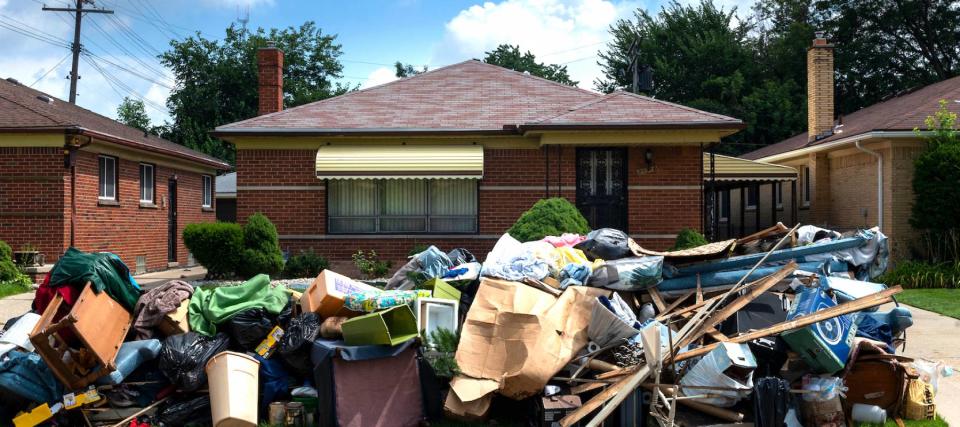The long federal ban on evictions is ending soon. Too soon?

Whether you’re a renter or a real estate investor, you probably have intense feelings about the upcoming end to the federal government's ban on evictions.
On June 30, the eviction moratorium put in place last September by the Centers for Disease Control and Prevention will expire. Various estimates put the number of renters who are behind on their rent between 6 million and 10 million. That’s an awful lot of people who could potentially find themselves out on the streets.
Protecting renting families from homelessness is inarguably the right thing to do. But has the eviction ban, which has shifted the financial burden from renters to landlords, been the right way to do it?
Renters still need help

When COVID-19 started its assault on the U.S. economy, the people hit hardest were at the lower end of the economy: service, retail and hospitality workers, many of whom rent.
Homeowners were provided something of a parachute in the form of low interest rates, which allowed them to refinance their mortgages and slash their monthly payments. But renters saw their incomes evaporate overnight and were given no clear timetable around a return to work.
Sensing the need to keep renters housed during the pandemic, the CDC issued its eviction moratorium on public safety grounds on Sept. 4, 2020. That order was set to expire on Dec. 31 of last year, but has been extended twice since then, first until March 31 and again until June 30.
"Researchers estimate that, in 2020, Federal, state and local eviction moratoria led to over 1 million fewer evictions than the previous year,” the CDC writes.
"Additional research shows that, despite the eviction moratorium leading to an estimated 50% decrease in eviction filings compared to the historical average, there have still been over 100,000 eviction filings since September," the agency continues, "suggesting high demand and likelihood of mass evictions."
Why the CDC banned evictions
The agency's original goal was to prevent homeless families from congregating in shelters and other shared spaces where they may be more likely to spread or contract the coronavirus. Thanks to a successful vaccine rollout, the health care emergency facing renters has been greatly reduced.
Their No. 1 threat now is eviction.
Under normal circumstances, it would be hard to advocate for anyone who hadn't paid rent in over a year. But COVID changed the game. Most renters who couldn't make their payments were forced into a terrible situation through no fault of their own.
Seen from this angle, the eviction ban prevents landlords from punishing otherwise stand-up tenants who would have preferred to keep paying rent.
Landlords need to pay their mortgages

Shortly after the eviction ban was implemented, the CDC found itself under siege from lawsuits claiming it had overstepped its boundaries and had no business legislating what landlords should be able to do with their own properties.
One suit, filed in Georgia, represented the National Apartment Association and its 85,000 members, many of whom are landlords who own only a few properties.
Another lawsuit was brought in Ohio by the National Association of Home Builders.
"The CDC’s order provided no relief for landlords who must continue to pay bills, maintain the units and pay their employees all while receiving no rent," the trade group said.
"Absent rental income, these small mom-and-pop property owners must continue to pay their mortgage, property taxes, employees and cleaning/maintenance services," said the builders. "And without sufficient rental income, a number of properties would be pushed into foreclosure."
Eviction called 'a remedy'
The issue, some landlords have pointed out, is that not everyone is behind on their rent solely because of COVID-19. Some stopped paying rent long before the pandemic, and have used the eviction ban as an excuse to avoid paying rent.
“There’s a reason they created eviction as a remedy,” Caleb Kruckenberg, the litigation counsel responsible for the Georgia-based challenge to the CDC’s ban, said in an interview. "At some point, a landlord cannot just keep housing this person who’s not paying rent, especially when the landlord has to pay. That’s why there’s eviction under all 50 states' laws."
One argument against further extending the CDC’s eviction ban is that there is now substantial financial assistance in place for renters. Through the two most recent COVID-19 relief bills, the government has made approximately $46 billion available to help tenants catch up. Plus, many states have offered to cover more than a year of missed rent.
The federal renter assistance program, because it’s being managed by local entities, has experienced its fair share of problems, including extended delays. Ironically, a brief extension of the CDC ban, which would allow these local agencies to shore up their shortcomings and better distribute the money they have available, might be the quickest way for landlords to get the money they're owed.
Save money — no matter which side of the debate you're on

Whether you’re a tenant or a landlord, the last 15 months have no doubt been brutal. Fortunately, you have options for strengthening your limited financial resources.
If you’re a landlord and haven’t refinanced your rental properties yet, get on it. Rates are so low right now that mortgage technology and data provider Black Knight says 14.1 million homeowners could save an average $287 a month by refinancing.
And while you’re slashing the cost of homeownership, why not shop around and see if you can score a better deal on homeowners insurance? A little comparison shopping also can help you cut the cost of your car insurance.
If you’re a renter who’s carrying a lot of high-interest debt — and don’t feel bad if you are; credit cards and personal loans have been lifesavers for many during the pandemic — those interest charges could gum up your finances for years. Taking out a lower-interest debt consolidation loan could help you pay off your debts faster.
And, no matter where you fall on the renter/owner divide, it doesn't take much to earn extra money in today’s raging stock market. A wildly popular app can help you invest in a diversified portfolio using nothing more than "spare change" left over from your everyday purchases.

